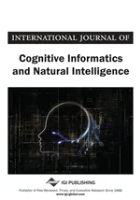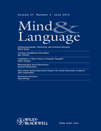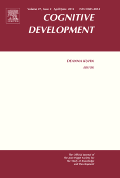
MINDS AND MACHINES
metrics 2024
Illuminating the Future of Intelligent Technologies
Introduction
MINDS AND MACHINES is a distinguished peer-reviewed journal published by Springer, specializing in the interdisciplinary realms of Artificial Intelligence and Philosophy. Founded in 1991, this journal continues to serve as a critical forum for exploring the intricate relationships between human cognition, artificial systems, and ethical considerations in technology. With an impressive impact factor positioned in the Q1 quartile for both the fields of Artificial Intelligence and Philosophy, MINDS AND MACHINES ranks as a top-tier publication, reflecting its significant contributions to ongoing scholarly discussions. The journal is indexed in Scopus, where it holds the number one rank in Philosophy within the Arts and Humanities category, and the 42nd position in the Computer Science segment for Artificial Intelligence, demonstrating its wide-reaching influence and high citation impact. Although it does not offer open access, its rigorous selection process ensures that only high-quality manuscripts are published, making it an essential read for researchers, professionals, and students aiming to stay at the forefront of developments in these rapidly evolving fields.
Metrics 2024
 1.95
1.95 4.20
4.20 7.50
7.50 51
51Metrics History
Rank 2024
Scopus
IF (Web Of Science)
JCI (Web Of Science)
Quartile History
Similar Journals

Teoria-Rivista di Filosofia
Engaging Minds in Rigorous Philosophical AnalysisTeoria-Rivista di Filosofia is a distinguished academic journal published by EDIZIONI ETS, based in Pisa, Italy. With a focus on philosophical discourse, this journal is a valuable resource for researchers, professionals, and students in the field of philosophy. Having achieved a commendable Q3 ranking in the 2023 category quartiles, Teoria stands out in the competitive landscape of philosophy journals, with a Scopus rank of #612 out of 806, placing it in the 24th percentile. Although currently classified as a non-open access publication, it frequently addresses cutting-edge themes and challenges within philosophical research, promoting rigorous analysis and diverse perspectives. The journal spans various topics across multiple issues from its inception in 2011 to its ongoing publications scheduled through 2024, making it a relevant venue for contemporary philosophical inquiry. The journal aims to foster scholarly communication and stimulate critical debates, contributing significantly to the global philosophical landscape.

International Journal of Cognitive Informatics and Natural Intelligence
Innovating at the Intersection of Intelligence and TechnologyThe International Journal of Cognitive Informatics and Natural Intelligence, published by IGI Global, is an essential resource for researchers and professionals exploring the intersections of cognitive informatics, artificial intelligence, and human-computer interaction. Since its establishment in 2007, this journal has focused on advancing the understanding of cognitive systems and their applications in natural intelligence, contributing significantly to the fields of software engineering and interface design. Operating out of the United States, the journal aims to disseminate high-quality research and innovative methodologies to foster interdisciplinary collaboration. Despite its current standing in Q4 quartiles for the fields of Artificial Intelligence, Human-Computer Interaction, and Software, it serves as a vital platform for emerging scholars and seasoned professionals alike seeking to explore new frontiers in cognitive technologies. While it does not provide direct open access, these publications are instrumental in shaping academic discourse, and contribute to ongoing advancements in how we understand and integrate cognitive science into practical applications.

Journal of Cognition and Culture
Connecting Cognitive Science with Cultural NarrativesThe Journal of Cognition and Culture, published by BRILL, stands as a pivotal resource in the fields of Cultural Studies, Social Psychology, and Experimental and Cognitive Psychology. With an ISSN of 1567-7095 and E-ISSN of 1568-5373, this scholarly journal has been contributing to the academic discourse since 2001 and continues to provide insights into the interplay between cognitive processes and cultural phenomena. Based in the Netherlands, it boasts impressive rankings, including Q2 in Arts and Humanities (Miscellaneous) and Q1 in Cultural Studies for 2023, reflecting its significance in addressing complex cognitive and cultural issues. Although it operates under a traditional access model, the journal's commitment to rigorous peer review and high-impact research ensures its relevance and authority in the field. Researchers, educators, and students alike will find the articles and studies published herein an invaluable addition to their understanding of how cognitive functions shape, and are shaped by, cultural contexts.

MIND & LANGUAGE
Advancing Insights at the Crossroads of Language and MindMIND & LANGUAGE, published by WILEY, is a premier academic journal that has established itself as a leading platform for interdisciplinary research at the intersection of linguistics, philosophy, and cognitive science. With a noteworthy impact factor and a remarkable ranking in the top quartiles (Q1) for both Linguistics and Language as well as Philosophy, it reflects the journal’s robust contribution to the academic community, garnering attention from researchers and scholars worldwide. Since its inception in 1986, MIND & LANGUAGE has provided an avenue for exploring the complexities of language perception, cognitive processes, and the philosophical implications of linguistic studies. Its comprehensive scope ensures that it remains a critical resource for professionals and students alike who are engaged in the exploration of language's role in human thought and society. The journal's rigorous peer-review process guarantees the high quality and scholarly integrity of the published work, making it an essential addition to any academic library.

COGNITIVE DEVELOPMENT
Illuminating Pathways in Developmental PsychologyCognitive Development is a prestigious academic journal published by Elsevier Science Inc, focusing on the critical area of developmental and cognitive psychology. With an ISSN of 0885-2014 and an E-ISSN of 1879-226X, this journal serves as a vital platform for the dissemination of innovative research, theories, and methodologies from 1986 to the present, with the latest articles contributing to a comprehensive understanding of cognitive processes in children and adolescents. Positioned in the second quartile (Q2) of both the Developmental and Educational Psychology and Experimental and Cognitive Psychology categories, Cognitive Development holds an essential place in shaping contemporary psychological research, boasting robust Scopus rankings of #175/360 and #90/165 in its respective fields. Though not an open-access journal, it provides valuable insights and rigorous studies essential for researchers, professionals, and students engaged in the intricate processes of cognitive development. Whether you're looking to publish significant findings or simply stay updated on the latest advancements, Cognitive Development is an indispensable resource in the psychological community.

CAAI Transactions on Intelligence Technology
Catalyzing Collaboration in Intelligent Technology ResearchCAAI Transactions on Intelligence Technology is a premier peer-reviewed journal published by WILEY, dedicated to advancing the fields of Artificial Intelligence, Computer Networks and Communications, Computer Vision and Pattern Recognition, Human-Computer Interaction, and Information Systems. Since its inception in 2017, this Open Access journal has rapidly ascended the ranks, achieving Q1 quartile status across multiple categories as of 2023, and is recognized for its rigorous standards and innovative research dissemination, evidenced by impressive Scopus rankings, including Rank #12 in Computer Vision and Pattern Recognition. Through its commitment to providing a platform for high-quality research, the journal invites contributions from scholars globally, fostering a collaborative environment that stimulates intellectual exchange and encourages advancements in intelligent technology. Addressed to researchers, professionals, and students alike, CAAI Transactions on Intelligence Technology serves as a vital resource for those aiming to stay at the forefront of technological innovation.

SCIENCE AND ENGINEERING ETHICS
Defining Standards of Integrity in Science and EngineeringSCIENCE AND ENGINEERING ETHICS is a prestigious journal published by Springer, focusing on the intersection of ethics in scientific and engineering practices. With ISSN 1353-3452 and E-ISSN 1471-5546, this journal has been a critical platform for the dissemination of research from 1995 and continues to thrive as it approaches its convergence in 2024. The journal commands a significant reputation in its field, boasting Q1 rankings across multiple categories, including Health Policy, Health (Social Science), Issues, Ethics and Legal Aspects, and Management of Technology and Innovation in the 2023 category quartiles. Researchers and professionals will find it indispensable, as it ranks impressively in various Scopus metrics, particularly in Nursing and Health Policy, where it consistently places in the top percentiles. While the journal is not open access, its robust contribution to ongoing debates in ethics surrounding science and engineering makes it an essential read for scholars and practitioners seeking to navigate the complex moral landscapes of their fields.

Humana Mente-Journal of Philosophical Studies
Navigating the Intersection of Philosophy and LinguisticsHumana Mente - Journal of Philosophical Studies is a distinguished peer-reviewed publication offering a dynamic platform for scholarly discourse in the fields of philosophy, linguistics, and the history and philosophy of science. Published by EDIZIONI ETS since its inception in 2007, this Open Access journal aims to facilitate the dissemination of high-quality research to a global audience. With its base in Pisa, Italy, Humana Mente addresses the linguistic intricacies and philosophical inquiries of our time and enjoys notable rankings, including Q2 in Philosophy and Linguistics, and Q2 in History and Philosophy of Science in the most recent 2023 category quartiles. The journal's significant impact is highlighted by its robust Scopus rankings, positioning it within the top percentiles across various disciplines. By fostering rigorous debate and innovative ideas, Humana Mente continues to be an invaluable resource for researchers, professionals, and students committed to advancing philosophical thought.

IEEE Computational Intelligence Magazine
Advancing Knowledge in AI and Theoretical Computer ScienceIEEE Computational Intelligence Magazine, published by the esteemed IEEE-INST ELECTRICAL ELECTRONICS ENGINEERS INC, is an essential resource for researchers and professionals in the fields of Artificial Intelligence and Theoretical Computer Science. With a robust Q1 ranking in both categories for 2023, this magazine stands out as a leader in disseminating cutting-edge research and innovative applications within computational intelligence. As an invaluable conduit for knowledge, it covers a diverse range of topics, including but not limited to machine learning, neural networks, and data mining. The magazine is particularly recognized for its interdisciplinary approach, bridging gaps between theory and application while contributing to advancements in technology and society. Although it does not offer open access, the insights provided are critical for staying at the forefront of this rapidly evolving discipline. Join a community of like-minded scholars and practitioners by exploring the latest findings and trends published from 2006 to 2024, operating from its headquarters at 445 Hoes Lane, Piscataway, NJ, United States.

Constructivist Foundations
Bridging Theory and Practice in Cognitive ResearchConstructivist Foundations is a distinguished academic journal dedicated to exploring the intersection of constructivist theories and interdisciplinary applications. Established in 2010 and published by ALEXANDER RIEGLER in Belgium, this journal aims to provide researchers, educators, and professionals with a platform to disseminate innovative ideas about learning, cognition, and scientific philosophy. With a focus on artificial intelligence, cognitive neuroscience, education, and the history and philosophy of science, Constructivist Foundations has made strides in contributing to meaningful discussions within these Q2 and Q3 ranked fields. Although it currently holds a Q4 status in several areas, it plays a crucial role in fostering knowledge and dialogue among scholars, thereby enhancing the understanding of constructivist principles across various domains. With robust academic engagement and open access options, this journal continues to shape the future of educational and cognitive research.